You can feed more than just seed!
Mealworms Are for the Birds 
Many birds eat insects naturally, so feeding mealworms to the birds is a natural thing to do. Plus, you’ll enjoy watching birds such as chickadees, bluebirds, wrens, towhees, woodpeckers, robins, catbirds, nuthatches, thrashers and others devour these mouthwatering morsels! A Red-breasted Nuthatch was seen taking mealworms from a feeder and caching them at a rate of three per minute.
Mealworms are the larvae of the beetle Tenebrio molitor. The larvae stage of the beetle typically lasts for 10 weeks. To maintain the larvae in a state of dormancy, they must be refrigerated at 40 to 50 degrees Fahrenheit (lower temperatures can kill the larvae). You can keep mealworms for several weeks and they will maintain their dormant state.
Birds typically look for food around the same time each day, so you can place worms in a feeder or tray at the same time the birds regularly visit. Make sure the birds can access the feeder but that the worms can’t crawl out! Mealworms are a great way to attract birds that don’t ordinarily come to seed feeders.
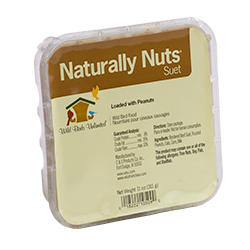 Feed Suet All Year Long
Feed Suet All Year Long
Suet is a high-energy, pure-fat substance that supplements birds’ daily diet year-round and is particularly helpful when finding insects to eat is difficult. All of our suets and no-melt suets contain high-quality ingredients, providing critical fats and calories and making every trip to the feeder count. Also, WBU suet is rendered to help remove some of the impurities that can cause spoilage.
Suet allows you to feed the birds year-round. Offer No-Melt Suet when seasonal temperatures are above 95º F and Suet when temperatures are below 95ºF. No-Melt Suet is designed to withstand temperatures up to 130° F.
Offering suet at a backyard feeding station is one way to attract a greater diversity of insect-eating birds. Birds that eat suet are usually our birds who prefer nuts such as woodpeckers, nuthatches, chickadees, titmice, etc. These birds do still try to find natural food sources, such as insects, insect eggs and larvae for a well-rounded diet it’s become however with the increase in man made development there are less bugs to go around which is why it is important to help supplement their diet.
Another way to offer suet is in suet cylinders- these smaller, densely, compact cylinders are great for non-migratory birds who love nuts. They are a great source for protein especially in winter since they are full of different types of pureed nuts and mealworms.
 Jim's Birdacious Bark Butter Now Every Tree is a Birdfeeder®
Jim's Birdacious Bark Butter Now Every Tree is a Birdfeeder® 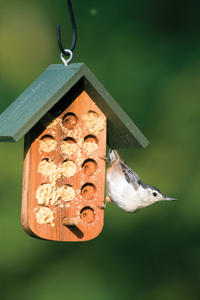
Jim Carpenter is the founder of Wild Birds Unlimited and the creator of Jim’s Birdacious® Bark Butter®, the food that has attracted more than 140 different bird species and counting. Click HERE to see how it is spread right on the trees.
Bark Butter is a spreadable suet that can be easily smeared on tree bark or a Bark Butter Feeder to attract birds such as chickadees, nuthatches, catbirds, cardinals, mockingbirds, wrens, woodpeckers, towhees, Brown Creepers, grosbeaks, robins and more. Available only at Wild Birds Unlimited, Bark Butter is made from suet, peanut butter and corn for a high energy treat your birds will love. It also contains calcium to help promote stronger bones. To see a visual demonstration of how to best use bark butter click HERE.
Bark butter bits and Bugs & Bits are both products which are made of bark butter but not in a spreadable form- this way you can feed all the nutrients of bark butter to your birds who are not clingers and need a feeder to get their food.
Nutty for the Nuts
Our feathery friends love nuts of all kinds but especially peanuts. Often times you see peanut pieces or shelled peanuts in some of our seed blends such as our tree nutty blend which has all kinds of nuts and is a great hearty blend for the winter months when natural sources of protein are sparse. Whole peanuts are a favorite of Blue Jays- they will usually take one peanut in the shell from the feeder fly back to the tree and then come back again for more. They are a great source of amusement watching them fly back and forth for their favorite snack. Woodpeckers, Chickadees, Titmice, and Nuthatches all love nuts of any kind. For a better way to attract these non-migratory birds to your backyard check out this short video on peanuts.
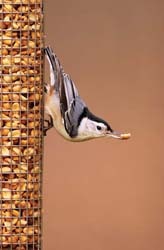

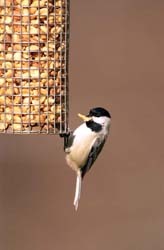
Ah, Sweet Nectar of Life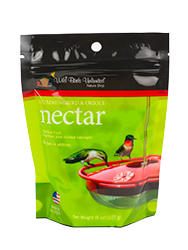
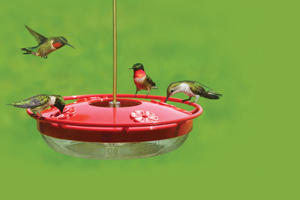 Our Wild Birds Unlimited Hummingbird and Oriole Nectar provides the high calories these active birds need. It contains no dyes or additives, is easy to mix and delivers wonderful results. Dissolve the contents of pouch in 4 cups of water and then fill your feeders. Any leftover solution can be stored in your refrigerator for up to one week for later use.
Our Wild Birds Unlimited Hummingbird and Oriole Nectar provides the high calories these active birds need. It contains no dyes or additives, is easy to mix and delivers wonderful results. Dissolve the contents of pouch in 4 cups of water and then fill your feeders. Any leftover solution can be stored in your refrigerator for up to one week for later use.
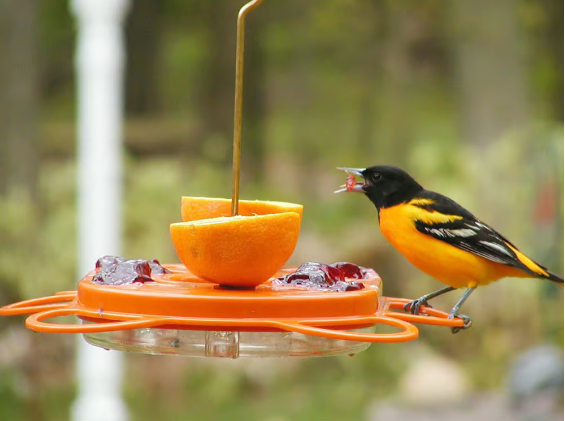 Fruit
Fruit 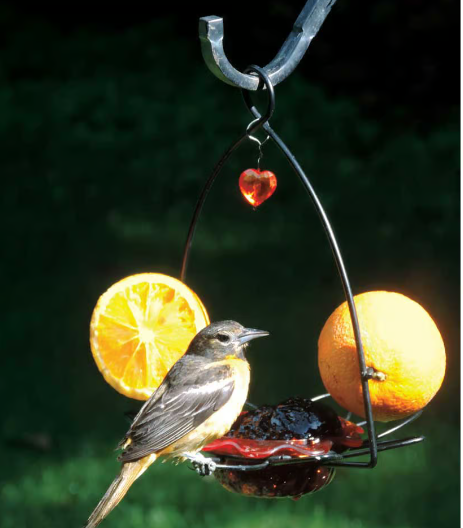
There is something about that grape jelly that keeps the Orioles coming back for more. These beautiful birds will eat the jelly right out of the jar- you can place a scoop into a shallow dish and it is serve ready. Orioles are also known for loving oranges and will be extremely grateful for some slices or halves added to your feeding station.
Make sure you are cleaning your jelly dishes and switching out your fruit slices regularly to keep away mold.
Fruit is a good supplement for our birds- make sure it appropriate for the birds in our area, cut the fruit into bite-sized pieces, remove spoiled fruit from the feeder, enjoy watching your birds trying a new treat.
Raisins are a great supplement for Robins when the ground is still frozen in Spring, you can sprinkle them right onto the ground or soak them in water overnight to rehydrate them into larger pieces however keep in mind- raisins are dangerous for dogs. So, if you have a dog in the family or a neighbor's dog visits regularly Raisins might not be a good choice for your yard.

